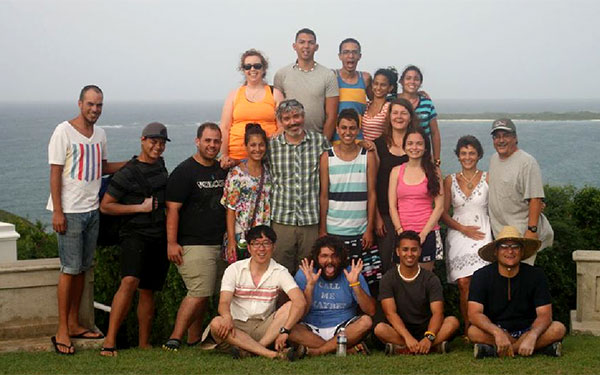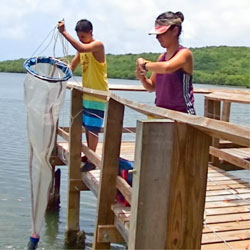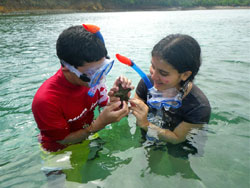Knauss legislative fellowships in Congress help build careers — and they're fun and educational. See our video and fact sheet for details.
Puerto Rico Undergraduate Education Initiative

Building a More Diverse Science Workforce
“Increasing the participation and success of underrepresented minorities in Science & Engineering (S&E) contributes to the health of the nation by expanding the S&E talent pool, enhancing innovation, and improving the nation’s global economic leadership.”
— National Academy of Sciences, 2011, “Expanding Underrepresented Minority Participation”
Maryland Sea Grant, the University of Maryland Center for Environmental Science (UMCES), and the Universidad Metropolitana (UMET) in Puerto Rico created the Puerto Rico Undergraduate Education Initiative in 2012 to provide opportunities for Hispanic undergraduate college students to conduct marine science in the island’s coastal lagoons.
Funded by the National Science Foundation (NSF), the initiative was born when UMET faculty reached out to Maryland Sea Grant regarding its long-running Research Experience for Undergraduates (REU) program. Since 1989, the Maryland program has trained over 360 students — more than half women and minorities — in estuarine research. NSF-funded REU programs strive to enhance diversity in the science workforce.
Providing a chance for students from underrepresented groups to experience the scientific method can inspire them to pursue careers in marine research. Positive research experiences for sophomores and juniors in Puerto Rico can also make them more competitive for undergraduate research training programs in the continental United States.
Initiative Outcomes
In partnership with UMET and UMCES, Maryland Sea Grant coordinated the initiative and provided limited professional development to students. Over four years, 40 undergraduates from UMET, Universidad del Turabo (UT), and Universidad de Puerto Rico en Bayamón (UPRB) participated in the initiative. Here are key project milestones and outcomes:
2012. Seven UMET students participated in a four-week summer research experience. They summarized their findings at two national meetings in February and April of 2013.
2013. Ten students participated in a six-week summer experience. They presented research posters at conferences in Puerto Rico and Texas. Three of these posters won awards.
2014. Three students and three Puerto Rican mentors participated in two-week summer research experiences at Horn Point Laboratory and Chesapeake Biological Laboratory, both part of UMCES.
One student from the 2012-2013 experience in Puerto Rico participated in Sea Grant’s 12-week REU program during summer 2014. She completed a longer-term project and got a chance to present her findings to marine science professionals.
2015. Thirteen students from Puerto Rico’s Universidad del Turabo (UT) participated in a one-week summer experience. Participants conducted research and also learned how to apply to graduate school.
.jpg)
Initiative Benefits
- Educated Puerto Rico undergraduates in marine science. The intention was to help students to obtain marine science internships in the continental United States and to pursue career opportunities in the field.
- Provided students an opportunity to learn how to use the scientific method to solve marine research problems. Over half of the students pursued additional undergraduate research opportunities following their involvement in the 2012-2014 programs.
- Fostered relationships between UMCES faculty and UMET and UT faculty and students. It promoted cooperation and collaboration between UMET, UT, and Maryland Sea Grant.
Student Achievements


- Five poster presentations at ASLO 2013.
- Three oral presentations at the 48th ACS Junior Technical Meeting in 2013.
- Two poster presentations at SACNAS 2013, including a Best Poster Award winner.
- Seven poster presentations at the Ana G. Mendez University System Research Symposium 2013, including two Best Poster Award winners.
- One poster presentation at ASLO 2014.
- One poster presentation at the Joint Aquatic Sciences Meeting in 2014.
- Three poster presentations at SACNAS 2015, including a Best Poster Award winner.
In addition, a number of students attended internships in Vermont, Texas, California, Maryland, and Puerto Rico following their research experience.
Research Focus: Coastal Lagoons
The research program was designed as a collaboration between UMCES, a world-renowned estuarine research institution, and UMET, UT, and UPRB. The latter three are minority-serving institutions in Puerto Rico that focus on undergraduate education.
Students came from a variety of fields, including computer science, biomathematics, environmental science, chemistry, general biology, and molecular biology. Their research projects focused on understanding the natural, economic, social, and cultural value of coastal lagoons in Puerto Rico.
The 2013 program added social science research opportunities. Students explored topics such as the social perception of Puerto Rico’s bioluminescent lagoon, Laguna Grande, in the nearby community of Fajardo.
A dinoflagellate (Pyrodinium bahamense) that lives in the lagoon luminesces when physically disturbed, producing a glow. Students studied lagoon organisms and nutrient dynamics and helped to develop remote monitoring technology.
Praise from Participants
Isabel Sanchez participated both in the Puerto Rico initiative and as a student in the Maryland Sea Grant REU program.
About the Program Partners
The University of Maryland Center for Environmental Science has four research locations: Chesapeake Biological Laboratory in Solomons, the Horn Point Laboratory in Cambridge, the Appalachian Laboratory in Frostburg, and the Institute of Marine and Environmental Technology in Baltimore.
The Universidad Metropolitana (UMET) is located in San Juan, Puerto Rico.
The Universidad del Turabo is located in Gurabo, Puerto Rico.
The Universidad de Puerto Rico en Bayamón (UPRB or UPR-Bayamón) is a state university located in the municipality of Bayamón, Puerto Rico.
Para la Naturaleza is a nonprofit unit of the Conservation Trust of Puerto Rico.
Department of Natural and Environmental Resources (DNER) of Puerto Rico.

Photograph credits: James Pierson and Pedro M. Maldonado





